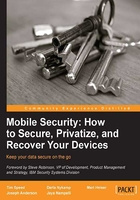
Summary
Our world is increasingly going mobile. Where we once had to use our computer to surf the Internet or had to go to the store to shop, we can now use our smartphone for both. What's more; we can often do these tasks simultaneously. This multi-tasking capability presents the possibility for new takes on old activities. Today, we might go to the store instead of shopping from our computer, but by bringing our smartphone, we're able to compare prices online while we visit the store, so we can touch and see the item we wish to purchase. In other words, we no longer have to choose between visiting the store and shopping online. Smartphones have allowed us to do both simultaneously.
Despite the advantages that this new mobile world offers, it is important to remember that there are also some distinct disadvantages. Facebook, Twitter, Target, Amazon, some government organizations, and even our phone carriers are able to track our activities on our smartphones. This may seem rather innocuous at first glance, but there is more to worry about than simply targeted sales. These tracking methods can be used to spread your personal information to numerous other entities for both legal and illegal purposes. After all, once the information is compiled, it becomes just like any other container of sensitive information; it can be stolen or utilized for purposes that we did not originally intend. Consider your wallet as an example, you keep your driver's license and credit cards in this container so that you can easily access them to purchase items or to prove your identity. However, just like with online data tracking, this wallet can be stolen and used to impersonate you or even be used to steal your resources. In Chapter 2, Users and Mobile Device Management, you will learn about the impacts you can experience based on how you company can control your device.
In this chapter, we discussed the ways in which mobile and smartphone technology has changed the way we live. Topics we discussed include:
- Social networking sites
- How sites we visit track us
- The iPhone as the most ubiquitous smartphone
- iOS and Android mobile operating systems
- How commerce is increasingly going mobile, from banking to shopping
- QR codes as a convenient method of creating an identity verifier in the mobile space
- Cloud computing and its applications
Also the specifics of the risks inherent in the new mobile world will be discussed and expanded upon in the later chapters. We are here to help you navigate this social world and to help keep you safe.